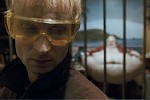 Arthouse films ’06
Arthouse films ’06< < M O R E | M O R E > >
last update 22.Oct.06
See also: SHADOWS FILM FESTIVAL | SHORT FILMS
 R E V I E W B Y R I C H C L I N E
R E V I E W B Y R I C H C L I N E Den Brysomme Mannen
Den Brysomme Mannen
 Surreal and often very funny, this Norwegian fable is like a Lynchian take on Being John Malkovich. And its comical parallel universe story contains a surprisingly bittersweet examination of the pointlessness of modern life.
Surreal and often very funny, this Norwegian fable is like a Lynchian take on Being John Malkovich. And its comical parallel universe story contains a surprisingly bittersweet examination of the pointlessness of modern life.
After a suicide attempt, Andreas (Aurvaag) is delivered to a bland modern city, then given a clean, featureless flat and a dull but easy accounting job. His boss (Joner) is nice enough. And the gorgeous interior designer (Barker) he meets at a party is happy to go out with him. As is a cute blonde colleague (Larsen). So why doesn't he feel happy? The food has no taste, sex is unsatisfying, he can't even injure himself properly. Then he hears a blast of real music coming through a crack in a wall.
Clearly this town is a metaphor for hell, where there's no way to experience either pleasure or pain. Andreas seems to be the only person aware that something is wrong, although someone tells him it'll take a while to get used to it. And fixers keep appearing to put him back on the straight and narrow. But the real originality here is in the fact that the afterlife is actually a carbon copy of this one. It just strips away the illusion of satisfaction of everyday mindless work, consumerism and shallow socialising.
Director Lien and writer Schreiner create such an engagingly quirky world that we can't help but join with Andreas in his curious exploration. Dreamlike touches abound, from a random badminton match to a body impaled on railings that draws no attention at all. It's shot in a straight-on manner that makes every room look like an Ikea display, and the dialog is hilariously bone-dry: "I'm leaving you"; "Not before Saturday, we're having guests."
Andreas' reactions are ours: he's the only one who cries at the movies, the only one who longs to hear the sound of a child. He can't understand why no one here has passion or emotion, and it's just not good enough for him. As it progresses, the film slowly accelerates until it shifts into an energetic, frantic thriller. And we're right with him; we certainly don't want to live like this. Anything at all would be preferable to this comfortable, untroubled life. Wouldn't it?
scr Per Schreiner
with Trond Fausa Aurvaag, Petronella Barker, Birgitte Larsen, Johannes Joner, Per Schaaning, Anders T Andersen, Ellen Horn, Sigve Bře, Hanne Lindbaek, Ivar Lykke
 release Nor 26.May.06,
release Nor 26.May.06, UK 25.May.07
06/Norway 1h35
CANNES FILM FEST
TORONTO FILM FEST

19.Oct.06 lff
 R E V I E W B Y R I C H C L I N E
R E V I E W B Y R I C H C L I N E Azul Oscuro Casi Negro
Azul Oscuro Casi Negro
 Following a young man whose coming of age is delayed by forces beyond his control, this intensely personal drama is engaging and honest, even when the plot gets in the way.
Following a young man whose coming of age is delayed by forces beyond his control, this intensely personal drama is engaging and honest, even when the plot gets in the way.
After his father (Colomé) has a stroke, Jorge (Gutiérrez) finds his entire life sidelined. Seven years later, he's finally managed to complete his business degree. But since with only janitorial experience, no employer will look at him. Then his brother Antonio (de la Torre) gets out of prison and everything changes. He asks Jorge for help impregnating his new girlfriend (Etura), but this might cause problems with Jorge's long-time on-off girlfriend Natalia (Pallarés). Or maybe it'll help clarify things once and for all.
The title refers to the colour of a suit hanging in a department store window that Jorge covets, so he can finally start his long-delayed career. This is a story about how life takes us down unexpected roads, forcing us to make the most of whatever we encounter along the way. These themes are deeply resonant, and make it very easy for us to identify with Jorge's frustration and yearning, especially as things seem to get worse for him by the day.
The cast is solid and likeable--even the shadier characters are recognisably human, in the sense that we can almost understand the terrible choices they've made. Jorge's best pal Sean (Arévalo) provides some comic relief, which then turns into a rather serious story all its own, although with an absurd edge. Gutiérrez is charming and sexy, realistically bouncing off the people around him. These are people who are full of attitude, humour, self-interests and conflicting emotions. In other words, they're like everyone we know.
The mix of tenderness and bitterness is a little awkward at times, and the plot is over-constructed and contrived, but film actually manages to say something important in Jorge's tendency to blame everyone else for his woes. He feels utterly trapped, but he'll never find his way or begin to make the right decisions until he takes responsibility for his own life.
with Quim Gutiérrez, Marta Etura, Raúl Arévalo, Antonio de la Torre, Héctor Colomé, Eva Pallarés, Manuel Morón, Ana Wagener, Roberto Enríquez, Daniel Muriel, Alex O'Dogherty, Marta Aledo
 release Sp 31.Mar.06,
release Sp 31.Mar.06, UK Oct.06 lff,
US 26.Oct.07
06/Spain 1h45
VENICE FILM FEST
TORONTO FILM FEST

6.Oct.06 lff
 R E V I E W B Y R I C H C L I N E
R E V I E W B Y R I C H C L I N E aka Naming Number Two
aka Naming Number Two
 This enjoyable family drama from New Zealand taps into universal issues as it celebrates (and challenges) South Pacific traditions. It's an involving story, even if the story structure betrays its stage roots.
This enjoyable family drama from New Zealand taps into universal issues as it celebrates (and challenges) South Pacific traditions. It's an involving story, even if the story structure betrays its stage roots.
Nanna Maria (Dee) is the family matriarch, and she's fed up with the feuding between her three children (Heke, Lees and Terei) and the way her five adult grandchildren seem to be assimilating into society and abandoning their roots. So one morning she announces that she wants her grandchildren to throw her a huge party at her house, Number 2, at which she'll announce who her successor will be. Of course, nothing goes as planned.
The characters are all vivid and engaging, led by the feisty, wonderfully expressive Dee. The young actors around her are all good--Blake as the responsible one who cares for Nanna's home, Naufahu as the man of her house, Horan as the successful city boy, McDowell as the flowery party girl, and Emile as the busy life-loving kid. These rough stereotypes are nicely blurred by complex writing and acting. Next to them the parents are simplistic cardboard cutouts; you can see why Maria skips their generation.
All credit to Fraser that we have no trouble keeping the characters straight. There are so many people jostling for our attention Altman-like, engaging in just about every pairing imaginable, that it would be easy to lose track of it all. But the script and direction are pointed without being gimmicky; we become participants in the events with them, laughing at Maria's demands even as we're intimidated by her.
There's a terrific sense of attitude throughout the film--everyone is rushed and grumpy, but willing to do their family duty. And as the day progresses, things relax hugely. The story includes a few energetically rowdy interludes and a couple of contrived incidents. But it plays beautifully on the collision of traditions between old and new worlds--Europe, Fiji, Kiwi. In the end it's sweet and emotional, but it maintains a sharp edge that makes it recognisably real. We just wish we could climb onto the screen and join the party.
with Ruby Dee, Mia Blake, Rene Naufahu, Xavier Horan, Miriama McDowell, Taungaroa Emile, Tuva Novotny, Antony Starr, Tanea Heke, Nathaniel Lees, Pio Terei, Te Paki Cherrington
 release NZ 16.Feb.06,
release NZ 16.Feb.06, UK Oct.06 lff,
US 27.Jul.07
06/NZ 1h34
SUNDANCE FILM FEST
BERLIN FILM FEST

18.Oct.06 lff
 R E V I E W B Y R I C H C L I N E
R E V I E W B Y R I C H C L I N E
 This Hungarian film is reminiscent of early Jeunet & Caro (Delicatessen) in its willingness to get both surreal and grotesque. Besides playing for laughs, filmmaker Pálfi is clearly making a provocative social comment.
This Hungarian film is reminiscent of early Jeunet & Caro (Delicatessen) in its willingness to get both surreal and grotesque. Besides playing for laughs, filmmaker Pálfi is clearly making a provocative social comment.
It's a story of three generations. Vendel (Czene) is a sex-starved soldier constantly tempted by the giggly daughters of his demanding commander (Gyuricza). Alas, Vendel instead impregnates his boss' enormous wife (Molnár), who gives birth to a chubby son Kalman (Trócsányi). He becomes a champion sport-eater with hopes of taking his discipline to the Olympics alongside his equally plump wife Gizi (Stanczel). But their son Lajos (Bischoff) is disappointingly skinny. He grows up to be a taxidermist with a plan to create the ultimate specimen, which will give his family a permanent place in history.
This film dwells strongly on bodily functions of every imaginable kind. The camera explores bodies of every shape and size, colouring skin with fire and ice, water and blood. It's almost overwhelmingly physical, and it'd be unbearable without the wit, irony and jet-black humour. Not to mention a surprising sweetness in these characters' deep desires to connect with each other.
This is stylish, outrageous filmmaking that challenges our concepts of youth, beauty, vitality and mortality. And it overflows with imagination. We never have a clue what's going to happen--or what extreme imagery we'll see--next. Pálfi's camera swoops and swirls through the garish settings, even as it adds meaning and resonance to people, places and objects. The effects work is inventive and eye-popping, adding an otherworldly tone that draws us in then grosses us out over and over again.
The story has an ageless fairy tale quality that occasionally intersects with real time and space, such as when Gizi takes her sport-eating team to the Los Angeles 1984 Olympics, or when we catch a glimpse of a Michael Jackson poster mischievously hanging in Lajos' chop shop. It's one of the most astonishing, energetic, chaotic films you'll ever see. And best of all, it could make you decide to give up the diet forever.
scr György Pálfi, Zsófia Ruttkay
with Csaba Czene, Gergely Trócsányi, Marc Bischoff, Adél Stanczel, Zoltán Koppány, István Gyuricza, Piroska Molnár, Gábor Máté, Géza D Hegedüs, István Hunyadkürthy, István Znamenák, Péter Blaskó
 release Hun 9.Nov.06,
release Hun 9.Nov.06, UK 13.Jul.07
06/Hungary Eurofilm 1h31
TORONTO FILM FEST

20.Oct.06 lff


See also: SHADOWS FILM FESTIVAL | SHORT FILMS
© 2006 by Rich Cline, Shadows
on the Wall